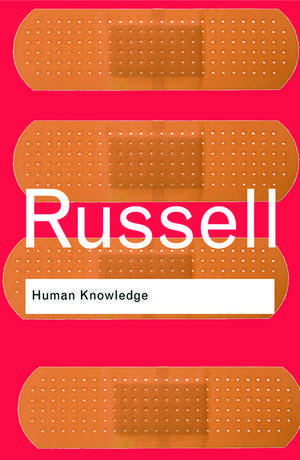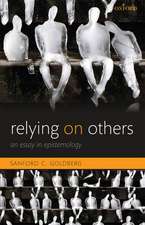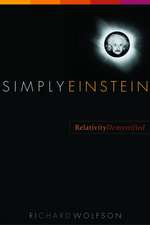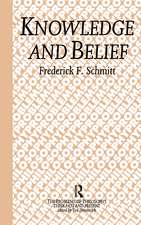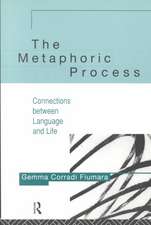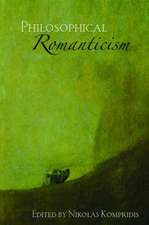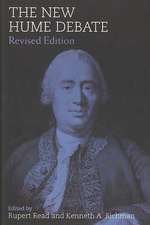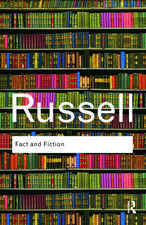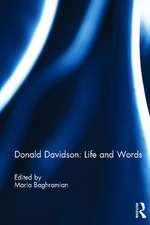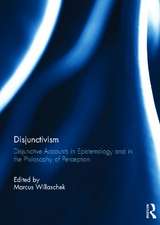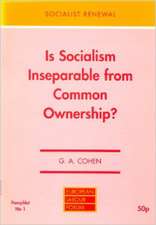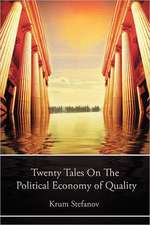Human Knowledge: Its Scope and Limits: Routledge Classics
Autor Bertrand Russellen Limba Engleză Paperback – 17 feb 2009
| Toate formatele și edițiile | Preț | Express |
|---|---|---|
| Paperback (2) | 126.60 lei 22-36 zile | +23.90 lei 5-11 zile |
| Taylor & Francis – 17 feb 2009 | 126.60 lei 22-36 zile | +23.90 lei 5-11 zile |
| Taylor & Francis – 21 mai 1992 | 446.75 lei 43-57 zile | |
| Hardback (1) | 902.60 lei 43-57 zile | |
| Taylor & Francis – 10 iul 2016 | 902.60 lei 43-57 zile |
Din seria Routledge Classics
- 5%
 Preț: 132.94 lei
Preț: 132.94 lei -
 Preț: 101.17 lei
Preț: 101.17 lei - 5%
 Preț: 89.26 lei
Preț: 89.26 lei -
 Preț: 153.71 lei
Preț: 153.71 lei -
 Preț: 113.15 lei
Preț: 113.15 lei -
 Preț: 145.76 lei
Preț: 145.76 lei -
 Preț: 125.23 lei
Preț: 125.23 lei -
 Preț: 108.21 lei
Preț: 108.21 lei - 5%
 Preț: 88.43 lei
Preț: 88.43 lei -
 Preț: 124.19 lei
Preț: 124.19 lei -
 Preț: 109.91 lei
Preț: 109.91 lei -
 Preț: 123.98 lei
Preț: 123.98 lei -
 Preț: 121.89 lei
Preț: 121.89 lei -
 Preț: 93.84 lei
Preț: 93.84 lei -
 Preț: 109.24 lei
Preț: 109.24 lei -
 Preț: 86.93 lei
Preț: 86.93 lei -
 Preț: 95.54 lei
Preț: 95.54 lei -
 Preț: 92.66 lei
Preț: 92.66 lei -
 Preț: 138.48 lei
Preț: 138.48 lei -
 Preț: 146.52 lei
Preț: 146.52 lei -
 Preț: 94.66 lei
Preț: 94.66 lei -
 Preț: 110.69 lei
Preț: 110.69 lei -
 Preț: 92.77 lei
Preț: 92.77 lei -
 Preț: 110.32 lei
Preț: 110.32 lei -
 Preț: 64.19 lei
Preț: 64.19 lei -
 Preț: 122.91 lei
Preț: 122.91 lei -
 Preț: 123.12 lei
Preț: 123.12 lei -
 Preț: 111.10 lei
Preț: 111.10 lei -
 Preț: 86.43 lei
Preț: 86.43 lei -
 Preț: 144.85 lei
Preț: 144.85 lei -
 Preț: 123.35 lei
Preț: 123.35 lei -
 Preț: 121.87 lei
Preț: 121.87 lei -
 Preț: 109.98 lei
Preț: 109.98 lei -
 Preț: 108.06 lei
Preț: 108.06 lei -
 Preț: 93.49 lei
Preț: 93.49 lei -
 Preț: 123.12 lei
Preț: 123.12 lei -
 Preț: 125.12 lei
Preț: 125.12 lei -
 Preț: 124.13 lei
Preț: 124.13 lei -
 Preț: 136.69 lei
Preț: 136.69 lei -
 Preț: 108.18 lei
Preț: 108.18 lei -
 Preț: 122.91 lei
Preț: 122.91 lei -
 Preț: 122.91 lei
Preț: 122.91 lei -
 Preț: 109.31 lei
Preț: 109.31 lei -
 Preț: 123.89 lei
Preț: 123.89 lei -
 Preț: 93.89 lei
Preț: 93.89 lei -
 Preț: 94.30 lei
Preț: 94.30 lei -
 Preț: 123.03 lei
Preț: 123.03 lei -
 Preț: 139.32 lei
Preț: 139.32 lei -
 Preț: 94.82 lei
Preț: 94.82 lei
Preț: 126.60 lei
Nou
24.23€ • 26.33$ • 20.37£
Carte disponibilă
Livrare economică 31 martie-14 aprilie
Livrare express 14-20 martie pentru 33.89 lei
Specificații
ISBN-10: 0415474442
Pagini: 480
Dimensiuni: 138 x 216 x 36 mm
Greutate: 0.58 kg
Ediția:1
Editura: Taylor & Francis
Colecția Routledge
Seria Routledge Classics
Locul publicării:Oxford, United Kingdom
Public țintă
General, Postgraduate, and UndergraduateCuprins
Introduction Part 1: The World of Science 1. Individual and Social Science 2. The Universe of Astronomy 3. The World of Physics 4. Biological Evolution 5. The Physiology of Sensation and Volition 6. The Sense of Mind Part 2: Language 7. The Uses of Language 8. Ostensive Definition 9. Proper Names 10. Egocentric Particulars 11. Suspended Reactions: Knowledge and Belief 12. Sentences 13. External Reference of Ideas and Beliefs 14. Truth: Elementary Forms 15. Logical Word and Falsehoods 16. General Knowledge 17. Fact, Belief, Truth, and Knowledge Part 3: Science and Perception Introduction 18. Knowledge of Facts and Knowledge of Laws 19. Solipsism 20. Probable Inference in Common-sense Practice 21. Physics and Experience 22. Time in Experience 23. Space and Psychology 24. Mind and Matter Part 4: Scientific Conceptions 25. Interpretation 26. Minimum Vocabularies 27. Structure 28. Structure and Minimum Vocabularies 29. Time, Public and Private 30. The Principle of Individuation 31. Causal Laws 32. Space-time and Causality Part 5: Probability Introduction 33. Kind of Probability 34. Mathematical Probability 35. The Finite-Frequency Theory 36. The Mises-Reichenbach Theory 37. Keynes’s Theory of Probability 38. Degrees of Credibility 39. Probability and Induction Part 6: Postulates of Scientific Inference 40. Kind of Knowledge 41. The Role of Induction 42. The Postulate of Natural Kinds 43. Knowledge Transcending Experience 44. Causal Lines 45. Structure and Causal Laws 46. Interaction 47. Analogy 48. Summary of Postulates 49. The Limits of Empiricism Index
Recenzii
‘His intelligibility comes of stating things directly as he himself seems them, sharply defined and readily crystallized in the best English philosophical style.’ - The Times Literary Supplement
'The nearest thing to a systematic philosophy written by one who does not believe in systems of philosophy. Its scope is encyclopedic...a joy to read.' - New York Times 'His intelligibility comes of stating things directly as he himself seems them, sharply defined and readily crystallized in the best English philosophical style.' - The Times Literary Supplement
Notă biografică
Bertrand Russell (1872-1970). The leading British Philosopher of the twentieth century, who made major contributions to the area of logic and epistemology. Politically active and habitually outspoken, his ethical principles twice lead to imprisonment
Descriere
How do we know what we "know"? How did we ߝas individuals and as a society ߝ come to accept certain knowledge as fact? In Human Knowledge, Bertrand Russell questions the reliability of our assumptions on knowledge. This brilliant and controversial work investigates the relationship between ‘individual’ and ‘scientific’ knowledge. First published in 1948, this provocative work contributed significantly to an explosive intellectual discourse that continues to this day.
